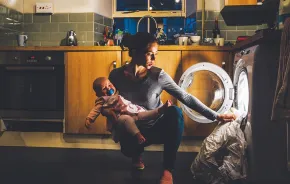
Having grown up in a traditional Jewish family, I’ve fancied myself somewhat of an expert on guilt. Turns out, I’m much more familiar with shame.
Did you just have a visceral response — and not a good one — reading that word? Shame. There it is again. Most of us have an aversion to shame: our own, someone else’s, the very thought of it.
Researcher and TEDEx celebrity Brené Brown defines shame as “The intensely painful feeling or experience of believing we are flawed and therefore unworthy of acceptance and belonging.”
Basically, “guilt” suggests we feel bad about or regret something we’ve said or done, which might propel us to change.
Not so much with shame. With its focus on our deficiencies and faults, shame tricks us into believing we can never change.
Why address shame in a post for parents? For starters, a lot of women experience motherhood as a shame trigger (whether or not we have kids). Parenting, too, is among the top shame categories, according to and researched by Brown.
The remaining ones are: appearance and body image; family; money and work; mental and physical health; addiction; sex; aging; religion; being stereotyped and labeled; speaking out; and surviving trauma.
While these categories apply to both genders, women’s shame is layered and contradictory — e.g., be sexy but not too sexy. Men’s shame, by contrast, centers on threats to masculinity — e.g., perceived weakness, failure or femininity. While not tied, specifically, to parenting, how men define what it means to be “a man” impacts their approach to being a husband and a dad.
Failing to meet gender expectations triggers shame in both men and women
The more I learn about shame, the more I’m convinced of its role in parents’ relationships issues, including complaints about childcare/housework, one of the most common topics heterosexual parents fight about. (Research suggests that same-sex couples battle less about these issues. Yet, if my wife and I are any indication, we might fight less about these topics than our straight peers, but we’re still fighting about them!)
My hunch is that despite strides in women’s rights, expanding definitions of fatherhood, and the prevalence of dual-income families, if masculinity is at issue for many men, and motherhood at stake for women, a lot of couples play out shame dynamics around the household division of labor.
The challenge is we’re not always (or often) aware of our shame triggers and what we think — e.g., I’m a man who’s cool with housework; I’m a woman who likes my hubby to clean — and what we feel, don’t always line up.
I’m not just thinking of some men’s conscious or unconscious resistance to childcare or housework, but also of some women’s mixed messages and judgmental responses to spouses when they do try to help.
Many moms feel the pressure of “doing it all”: working in or outside the home, caring for kids, running a household, supporting others, tending to ourselves. That pressure easily morphs into shame when the reality hits that we can’t do it all, or at least not for long.
Some men’s shame might, then, be triggered by doing certain kinds or amounts of childcare/housework or by being asked to help more, which might feel emasculating. Plus, just as some women hold themselves to unattainable standards, so too might our spouses hold us to our standards, and sometimes judge us for not handling everything child- and house-related.
Likewise, asking for assistance triggers some moms’ shame, so we judge ourselves harshly for asking and our spouses for helping:
“I might not be able to do it all, but at least I know how to do it right!”
I genuinely believe that men and women who say they want more equitable relationships really do. I also believe that what we want and what we act out in daily life doesn’t always sync up.
How can we decrease shame’s impact on us as individuals and as couples?
Start by increasing awareness of how shame feels to you and what triggers it, especially around relationship and parenting issues.
Most of us experience shame physically. In my case, my throat tightens, I get nauseous, and I simultaneously feel paralyzed and defensive.
In addition to increasing shame awareness, Brown suggests three tools to reduce shame’s impact, all of which can be explored with spouses (and older kids):
1. Contextualize. Shame is often taught or reinforced by social, religious, educational, media, government or other influencers. Recognizing the degree to which our shame is reinforced by larger cultural forces helps us to…
2. Normalize. Shame is a lonely experience, yet we all feel it. Whichever shame categories trigger us, there are many women and men who, also, feel shame in those areas. We’re not alone, which is why it’s important to…
3. Demystify. Speaking out about shame with those we trust to respect our honesty can be supportive, if scary. Plus, it reduces shame’s sting.
Feeling ambivalent about looking at shame? I get it. I do. But we all benefit from considering shame’s impact on us and our kids. As Brown writes, “Parenting is a shame minefield. Not only do we hang our self-worth on how we are perceived as parents, but we hang a big part of it on how our children are perceived.”
Unless we decrease shame’s effect on us, we’re poised to pass it on to our kids. Since they’ll get a good dose of it anyway (in school, sports, dating), it’s up to us to lessen its impact on our lives. Doing so will benefit our entire family.
There’s no shame in that.
 Rhona Berens, PhD, CPCC is a mom and an Individual and Relationship Systems Coach who is passionate about giving parents fun and easy tools to achieve and maintain personal and relationship happiness. She’s the Founder of Parent Alliance® (parentalliance.com), a great resource for parents and expecting couples. With more than 20 years’ experience as an educator and mentor, Berens delivers dynamic talks, workshops and webinars to parents, teachers, expecting couples and doulas. Berens coaches individuals and couples across North America via phone and online video, or in person in Los Angeles. She serves on the Advisory Board of The Children’s Project, a nonprofit devoted to helping parents and teachers raise emotionally healthy children. For more information, email Rhona.
Rhona Berens, PhD, CPCC is a mom and an Individual and Relationship Systems Coach who is passionate about giving parents fun and easy tools to achieve and maintain personal and relationship happiness. She’s the Founder of Parent Alliance® (parentalliance.com), a great resource for parents and expecting couples. With more than 20 years’ experience as an educator and mentor, Berens delivers dynamic talks, workshops and webinars to parents, teachers, expecting couples and doulas. Berens coaches individuals and couples across North America via phone and online video, or in person in Los Angeles. She serves on the Advisory Board of The Children’s Project, a nonprofit devoted to helping parents and teachers raise emotionally healthy children. For more information, email Rhona.









